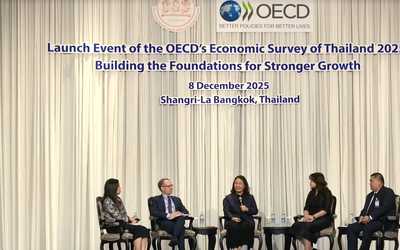Age-Dependent Risk Aversion: Re-evaluating Fiscal Policy Impacts of Population Aging

เมื่อวันที่ 4 พฤศจิกายน 2565 ดร.พิทวัส พูนผลกุล จากสถาบันวิจัยเศรษฐกิจป๋วย อึ๊งภากรณ์ ได้นำเสนอผลงานวิจัยในงาน PIER Research Exchange ในหัวข้อ “Age-Dependent Risk Aversion: Re-evaluating Fiscal Policy Impacts of Population Aging”
ที่ผ่านมา หลายงานศึกษาใช้แบบจำลอง Overlapping Generations (OLG) เพื่อเปรียบเทียบนโยบายรักษาเสถียรภาพด้านการคลังภายใต้สังคมสูงวัย โดยหนึ่งในเกณฑ์ที่มักถูกนำมาใช้จัดอันดับทางเลือกนโยบายต่าง ๆ คือการประเมินสวัสดิภาพของครัวเรือนในเศรษฐกิจ อย่างไรก็ดี การศึกษานี้เสนอว่าแบบจำลองส่วนใหญ่ไม่ได้คำนึงถึงปัจจัยที่สำคัญ 2 มิติ คือ
- ความกลัวความเสี่ยง (risk aversion) ที่แตกต่างกันในแต่ละช่วงอายุ
- ความไม่แน่นอนของอรรถประโยชน์ (utility) ที่อาจเกิดขึ้นในช่วงชีวิต
งานศึกษานี้ได้พัฒนาแบบจำลองที่คำนึงถึง 2 มิติดังกล่าว และพบว่ากลุ่มครัวเรือนที่มองว่าตนเองจะกลัวความเสี่ยงมากขึ้นเมื่ออายุสูงขึ้น (age-dependent increasing risk aversion: IRA) จะมีชั่วโมงทำงานและการเก็บออมมากกว่ากลุ่มครัวเรือนที่กลัวความเสี่ยงเท่ากันในทุกช่วงอายุ (constant risk aversion: CRA) เนื่องจากกลุ่ม IRA ต้องการสะสมทรัพยากรมาใช้ในการดูแลความเสี่ยงมากกว่า นอกจากนี้ ผลการศึกษายังพบว่าการใช้มาตรการขยายอายุเกษียณหรือการลดเงินบำนาญจะส่งผลให้ความผันผวนในช่วงสูงวัยปรับสูงขึ้นเมื่อเทียบกับการขึ้นอัตราสบทบ จึงเป็นการสร้างต้นทุนให้กับคนกลุ่ม IRA ที่ต้องแบ่งทรัพยากรส่วนหนึ่งมาดูแลความไม่แน่นอนที่เพิ่มขึ้นดังกล่าว








